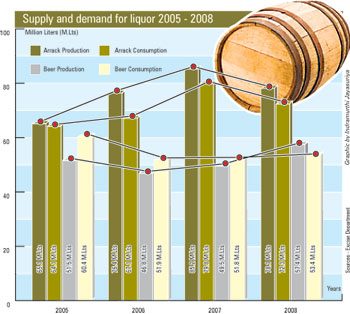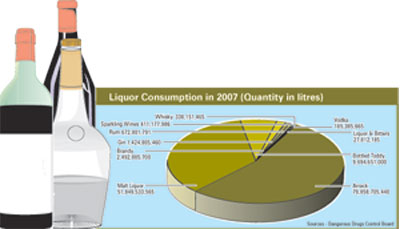The Mathatha Titha campaign, aimed at discouraging alcohol consumption, has suffered setbacks, the main reason being that consumers are clearly unwilling to change their habits.
In fact, the reverse appears to be the case: The number of alcohol consumers has significantly increased, and so have production and sales.
The government launched the programme largely at the behest of hardline coalition partners, such as the Jathika Hela Hurumaya (JHU), and has pumped Rs. 20 million into the campaign. The ground reality, however, is that alcohol consumption is on the rise.
One of the first steps in the campaign was to prohibit the endorsement of alcohol and tobacco in any form in the media, from advertising to media content, and sponsorship of sports or other events or programmes.
Meanwhile, the prices of wine and spirits have been increased steadily over the years, with the apparent motive of discouraging consumption.
All to no avail. Alchohol users are swelling in numbers, and those who cannot afford to buy legitimate alcohol are switching to illegal brews such as kasippu, while others are even producing their own arrack.
D. G. M. V. Hapuarachcchi, the Commissioner General for Excise, told The Sunday Times that the production, consumption and sale of almost all alcohol products has been growing over the past four years, and that the trend looks set to continue.
“The plain truth is that users are consuming more and more alcohol despite the awareness-raising campaigns, the restrictions and the price hikes,” Mr. Hapuarachcchi said, adding that it was an uphill struggle to discourage usage.
He said there has been an alarming increase in the consumption of illicit brews, such as kasippu (moonshine), even among people who had previously scoffed at the idea of consuming such brews.
“In the past it was the lower strata of society that consumed illegal brews,” he said, “but we now see persons from the middle class going in for such brews, because they cannot afford licensed drinks.”
The Commissioner General for Excise stressed that the kasippu industry should be eliminated because it was a danger to society.
“Among kasippu consumers, it is common to see the breadwinner spending his day’s wages on kasippu while the family at home goes hungry,” Mr. Hapuarachcchi said.
“There is also the grave health risk. Most kasippu manufacturers use dangerous substances, such as agro chemicals, and so on, in their brew. Their idea is to produce a strong drink and make a quick buck. What happens to the kasippu consumer is of no interest to the producer.”
The Excise Department has declared war on kasippu producers. “We have a special task force, comprising four units and some 200 officers, each headed by a superintendent. Theirs is a 24-hour operation. Raids on illicit distillers have intensified, and these have proved highly successful.
In the first five months of this year we made 20,473 detections,” Mr. Hapuarachcchi said.
 |
| The plain truth is that users are consuming more and more alcohol despite the awareness-raising campaigns, the restrictions and the price hikes.” D. G. M. V. Hapuarachcchi,
Commissioner General for Excise |
“In the first three weeks of the month alone ending June 25 the task force made 566 detections, mostly alcohol related but including a few narcotics and other cases as well,” he said.
Meanwhile, the Jathika Hela Hurumaya (JHU), which spearheaded the anti alcohol campaign, is tacitly admitting the programme so far has not been a success by calling for a 100 per cent increase in alcohol prices.
JHU Parliamentarian Ven. Athureliya Rathana Thera believes this is the only effective way to stamp out alcohol usage across the country.
“The government injection of Rs. 20 million into the campaign has not gone waste – there has been some success at village level,” he said, without elaborating.
The Thera said Sri Lanka could adopt Malaysia’s practice of permitting liquor but only for foreigners. “This could be done with special licenses issued to the hotel industry, which is sanctioned by the Tourist Board,” he said.
(It should be noted that Malaysia is largely a Muslim nation, with 60.4 percent of its population of 27.5 million being Muslim. Alcohol consumption is forbidden by the Muslim religion.)
Meanwhile, the left-leaning Janatha Vimukthi Perumana (JVP), which raised the issue in Parliament last week, said the Mathatha Thitha programme was doomed from the start because a number of government politicians, up to the highest levels, had vested interests in the alcohol business, and were not likely to let go of these too easily.
According to JVP MP Ranaweera Pathirana, dozens of government ministers and MPs have obtained liquor trading licenses for themselves, close relatives and friends, while others, he alleged, were on the payroll of the “kasippu barons”.
“The whole thing is a farce,” Mr. Pathirana told The Sunday Times. “This is government propaganda to distract the masses who are hit by the high cost of living.
“There are more urgent and pressing matters for the government to address. The government should be focused on making life a bit easier for the people, instead of burning up energy and resources on a campaign that’s not worth the money that’s been put into it,” Mr. Pathirana said.
He said it would be more to the point if the government focused on such issues as rampant corruption and waste at the highest levels.
 |
"We need to be reminded that liquor is a vital ingredient in the tourism and hotel industries.”- Hiran Cooray, president,
Ceylon Hoteliers Association |
“Of course, we don’t want to see pubs and taverns mushrooming at every street corner. But it was the government that encouraged the trade in the first place. It must now take full responsibility,” Mr. Pathirana said.
He also warned that the anti-alcohol campaign was not helping the country’s tourism and hotel industries, which were finally showing signs of reviving after being hit hard and repeatedly by three decades of war.
Hiran Cooray, president of the Ceylon Hoteliers Association, said Sri Lanka could not afford to compromise in any way its tourism and hotel industries. “The authorities must get their act together,” he said. “On the one hand the state is desperately trying to promote tourism and is allocating billions to this end, and on the other it is making life miserable for the hotel industry with all these liquor-related restrictions.
“The government issues liquor licences only to large hotels approved by the Tourism Board, while ignoring all those hundreds of outlets whose main customers are tourists. “Before 2005, Tourist Board-approved hotels could operate liquor outlets even if there were schools or places of worship within a distance of 500 metres.
“Now the law has been changed, and even Tourist Board-approved liquor outlets cannot operate within a distance of 500 metres,” Mr. Cooray said.
“A serious re-think is needed by the authorities. There should be specific conditions to protect and support the hotel industry. We can’t afford to lose a single tourist dollar. “The country has been drained for far too long by the bloody separatist conflict. Now we need to start recovering the money we lost to the war.
“Otherwise, the whole purpose of promoting tourism abroad at huge expense is lost,” he said. “We need to be reminded that liquor is a vital ingredient in the tourism and hotel industries. Discourage liquor and you hurt business,” Mr. Cooray said.
Sergeant drowns while chasing
kasippu maker
A police sergeant drowned on Thursday while giving chase to a fleeing kasippu distiller in Polonnaruwa.
According to police sources, the sergeant and another police officer had fallen into the Mahaweli River, in Polonnaruwa, while pursuing the suspect. The surviving police officer, who had managed to swim to safety, is being treated at the Polonnaruwa hospital.
The incident occurred in the village of Dimbulagala.
Cutting down on licences, stepping up the raids
Outlining government action taken under the Mathatha Titha campaign, Minister of Finance and State Revenue Ranjith Siyambalapitya told Parliament last week that there has been a significant reduction in the number of liquor licenses being issued.
In 2003, 2004 and 2005 the number of licenses issued was 185, 203 and 132 respectively, the minister said. In 2006, however, only 35 licenses were issued, 32 of which were given at the request of the Sri Lanka Tourist Board, while the balance were given out on court orders.
“Similarly, in 2007, 42 licences were issued, of which 41 were at the Tourist Board’s request, and one on a court ruling. In 2008, 36 licenses were issued, all at the Tourist Board’s request,” Minister Siyambalapitya said.
So far this year only 19 licenses have been issued, all at the Tourist Board’s request, he added.
The minister pointed out that the tax on alcohol products has been increased by 100 percent over the past few years. “This was not to increase revenue for the government but to discourage people from buying alcohol,” he said.
The minister said the government was stepping up action to discourage alcohol usage: the Excise Department is being beefed up with more staff, and new supermarkets will not be given liquor license in future.
“Raids on liquor stores suspected of breaking the law have increased significantly. For example, the number of such raids were 39,767, 48,748 and 45,993 in 2003, 2004 and 2005 respectively. But there were 52,644 raids in 2006, 56,476 in 2007, and 56,510 in 2008.” |




